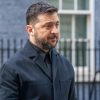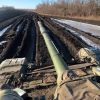A special court in The Hague has begun hearings on war crimes committed by Kosovo’s former separatist fighters, more than two decades after its war for independence from Serbia and nine years after a prosecutor was first appointed to investigate reports of atrocities.
Over the past week the Kosovo specialist chambers have ordered the arrest of three former members of the Kosovo Liberation Army (KLA), who were detained by EU police and transferred to the Netherlands. Two of them have already appeared before a judge, in a specially built courtroom fitted with transparent screens as a precaution against coronavirus.
The start of the long-delayed court proceedings could have profound effects on Kosovo and its tense relations with Serbia. In June Kosovo’s president, Hashim Thaçi, was charged by the special prosecutor with war crimes and crimes against humanity. The charges have yet to be confirmed by a judge. Thaçi was formally questioned on the charges in July and has proclaimed his innocence.
The charges prevented Thaçi from attending a signing ceremony with his Serbian counterpart, Aleksandar Vučić, for an agreement on limited steps towards economic normalisation. The pact was eventually signed on 4 September by Kosovo’s prime minister, Avdullah Hoti, but considerable tensions remain and neither Serbia nor its supporters including Russia and China have so far recognised Kosovo’s independence.
Nasim Haradinaj, the deputy head of the KLA veteran’s association, appeared in court on Tuesday charged with obstructing justice and intimidating witnesses. He told the presiding judge, Nicolas Guillou, he had been well treated but he challenged the court’s jurisdiction.
“I do not recognise this chambers, I do not recognise your work,” he said. “You have violated every human law and the right to expression and even if you sentenced me to 500,000 years I think you cannot do anything to change my opinion.”
On Monday a former KLA commander, Salih Mustafa, appeared in court charged with one count of murder, arbitrary detention, cruel treatment and the torture of at least six inmates at a detention camp in 1999. The victims were accused by KLA fighters of collaborating with Serbs or not supporting the KLA, according to the indictment. Mustafa did not enter a plea.
Some war crimes committed during the 1998-99 Kosovo conflict were tried by the international criminal tribunal for the former Yugoslavia, also based in The Hague, but the tribunal focused largely on Serbian atrocities.
Evidence subsequently emerged of the involvement of some KLA leaders in alleged atrocities, and the EU appointed a US prosecutor, Clint Williamson, to run a preliminary investigation in 2011.
On the basis of Williamson’s findings, the Kosovo specialist chambers were set up in 2015. The chambers’ work has been delayed by political turmoil and widespread witness intimidation in Kosovo.






















































Свежие комментарии